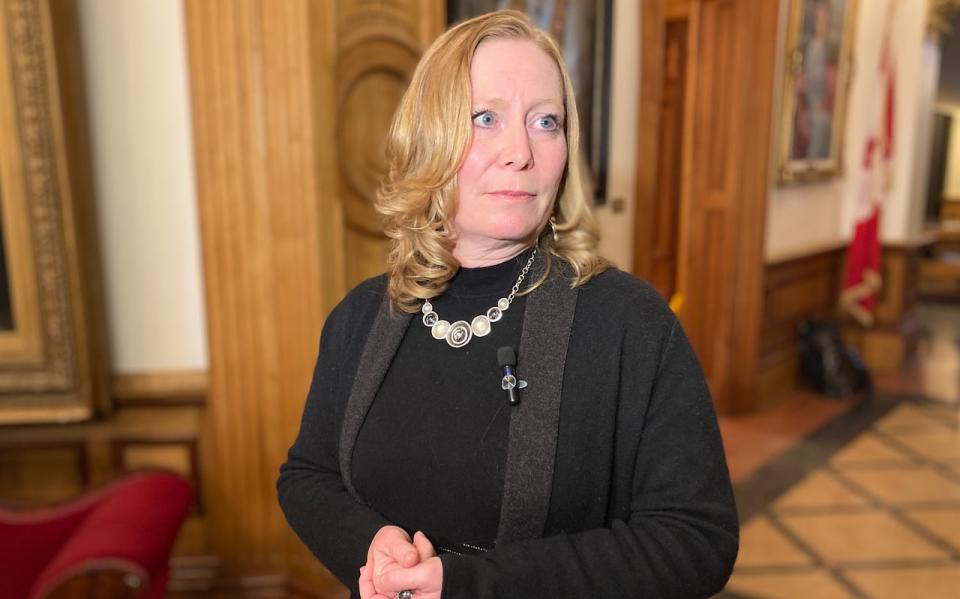Province scrambles to fix legal 'gap' affecting vulnerable children

Dozens of vulnerable children from abusive and neglectful homes find themselves in a legal void thanks to an error in legislation adopted by the Higgs government last December.
The mistake — the omission of a single line from the bill — has left provincial legal officials scrambling to sort through how to avoid the reversal of child protection orders issued by the courts between Dec. 13 and Jan. 25.
"The government is working diligently to ensure no actions taken during the gap period are invalid or overturned," said a press release issued Friday.
It says the government will introduce legislation to retroactively fix the error when MLAs resume the session in March.
Attorney General Ted Flemming said in a statement no children were negatively affected during the 43-day legal gap created by the mistake.
"New Brunswickers can remain confident that protecting children is of paramount importance and that the safety of vulnerable children has been maintained," he said.

Social Development Minister Jill Green introduced amendments in the legislature last October that were studied by a committee of MLAs for four hours before finally winning approval and getting royal assent on Dec. 13. (Jacques Poitras/CBC)
"As soon as the department became aware of the error, we acted to have it corrected."
The law allows the province to take custody of children at risk.
Social Development Minister Jill Green, who introduced the flawed bill, did not immediately respond to an interview request Friday afternoon. A spokesperson for Flemming said he was not available.
Cabinet proclaimed the new Child and Youth Well-Being Act at midnight on Thursday to close the legal void.
The act was approved by the legislature in June 2022 but left unproclaimed — not put into legal effect by cabinet order — so that officials could make changes to it.
Green introduced amendments in the legislature last October that were studied by a committee of MLAs for four hours before finally winning approval and getting royal assent on Dec. 13.
No one — including officials from Green's department, government lawyers who drafted the changes and MLAs who debated them — noticed that the fall 2023 amendments carried no timeline for proclamation by cabinet.
That meant that by default, they took effect immediately after royal assent on Dec. 13.

Green Party Leader David Coon said it’s not the first time a Higgs government bill has included flaws that needed to be fixed later. (Shane Fowler/CBC)
As a result, provisions repealing large sections of the existing Family Services Act kicked in right away — without the passed-but-still-not-proclaimed 2022 law being on the books to replace those sections.
"This resulted in no legislative child protection or adoption provisions being in force during this time," Friday's release said.
During committee study of the amendments last November, Green said she was "disappointed" by suggestions from opposition MLAs that they were rushed.
She said more than 300 departmental employees took part in 17 in-person and 37 virtual engagement sessions about the bill and its regulations.
Green Party Leader David Coon said it's not the first time a Higgs government bill has included flaws that needed to be fixed later.
He acknowledged opposition MLAs who debated the amendments also let the omission go by but said that's in part because the legislature's rules don't allow the calling of expert witnesses on most legislation.

In November 2022, then-Social Development Minister Dorothy Shephard had to legislate new timelines for child protection cases to address major delays in court hearings. (CBC)
"You're left to the non-expert eyes of MLAs without any professional input," said Coon.
It's not clear who finally noticed the flaw in the legislation, but Green said in the press release that Thursday's midnight proclamation of the new act was earlier than planned.
Now that it is in place, the province could face the prospect of dozens of legal challenges to child protection orders issued during the gap period.
An assistant to Court of King's Bench Chief Justice Tracey DeWare said in an email that she was "aware of the issues surrounding the coming into force of the Child Youth and Well-Being Act" but the assistant referred questions to the Department of Justice.
The new law modernizes the province's approach to child custody cases and adoption, including, the government says, more flexible court procedures and allowing children to be placed in the homes of relatives or people they know in their community.
It's not the first time the law's development has needed a fix.
In November 2022, then-Social Development Minister Dorothy Shephard had to legislate new timelines for child protection cases to address major delays in court hearings.
The new timelines were in the 2022 Child and Youth Well-Being Act but because its proclamation was being delayed, the existing Family Services Act had to be changed to also include the timelines.
The new timeline of 90 days for hearing custody cases was established after DeWare issued a directive to prioritize such cases.
She said court backlogs were preventing the cases from being heard within the previous requirement of 30 days.


